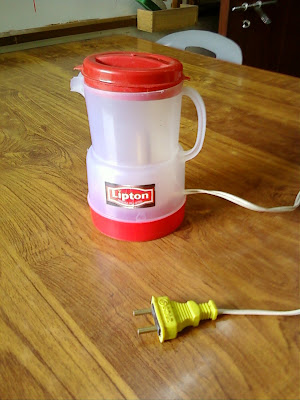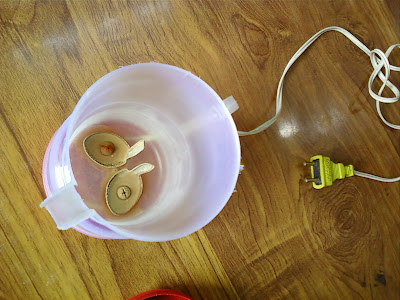I wanted something to keep in my office to heat up water to make tea or instant coffee (the only kind of coffee you can buy outside of the big cities). So, I found this nifty gadget in a shop in the market of Gaibandha. It works great and does just what I wanted it to do, which is heat a small amount of water quickly. How it does that trick is the interesting part.

As you can see in this next picture, the whole contraption is basically just a plug that goes into a power socket, and two bare electrodes that stretch into the water. That means that it is just running an electric current right through the water in order to heat it up. If you were to touch the water while it was doing this, in addition to getting a burn from the boiling water, you would also get electrocuted. And, not even a warning sticker on that thing... [there was a small note on the box, now thrown away, that users should not touch the water while heating].

[For Engineers Only] If you notice, there is also a different in the corrosion between the two electrodes. I could ask you which is the anode and which is the cathode as there is obviously some difference in oxidation and deposition going on between the two, but it is a 220V AC line, so what it really means is that there is a DC bias in the power supply, and that I normally plug in the heater in the same way each time. Oh, and yes you can clearly see the hydrogen and oxygen bubbles from the electrolysis of the water when you first plug it in, before it gets hot enough for the steam bubbles to obscure everything else. It is also funny to think that this thing won't work with distilled water as it is an insulator (unless you leave it sitting there long enough for some iron ions to work their way into it), luckily for this thing, the water in Gaibandha is loaded with iron and other minerals.
Then, it gets even funnier. The "Lipton" logo label is not real, the company that made it, Dhaka Plastic, is not associated with the Lipton tea company at all, they just put that on there so people think about having tea and needing this little contraption. How many more water heaters they sell because of that I don't know.

So, you can get all kinds of things here, even stuff that would be outlawed in the U.S., meaning that you can make good use of your money, if you are also smart enough to not get killed by the things you buy.


















